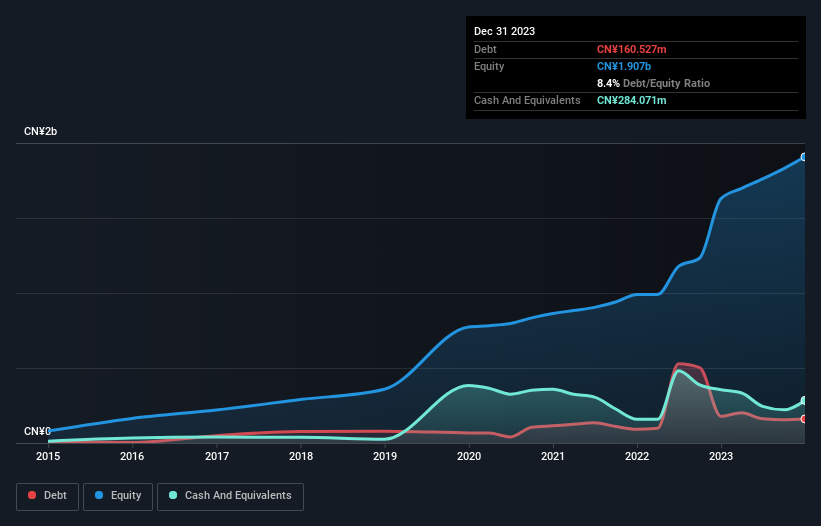- China
- /
- Electronic Equipment and Components
- /
- SZSE:300811
Does POCO Holding (SZSE:300811) Have A Healthy Balance Sheet?
Warren Buffett famously said, 'Volatility is far from synonymous with risk.' So it seems the smart money knows that debt - which is usually involved in bankruptcies - is a very important factor, when you assess how risky a company is. We note that POCO Holding Co., Ltd. (SZSE:300811) does have debt on its balance sheet. But should shareholders be worried about its use of debt?
Why Does Debt Bring Risk?
Generally speaking, debt only becomes a real problem when a company can't easily pay it off, either by raising capital or with its own cash flow. If things get really bad, the lenders can take control of the business. However, a more common (but still painful) scenario is that it has to raise new equity capital at a low price, thus permanently diluting shareholders. Of course, plenty of companies use debt to fund growth, without any negative consequences. When we think about a company's use of debt, we first look at cash and debt together.
View our latest analysis for POCO Holding
How Much Debt Does POCO Holding Carry?
The image below, which you can click on for greater detail, shows that POCO Holding had debt of CN¥160.5m at the end of December 2023, a reduction from CN¥177.6m over a year. However, it does have CN¥284.1m in cash offsetting this, leading to net cash of CN¥123.5m.

How Healthy Is POCO Holding's Balance Sheet?
We can see from the most recent balance sheet that POCO Holding had liabilities of CN¥273.6m falling due within a year, and liabilities of CN¥330.8m due beyond that. Offsetting these obligations, it had cash of CN¥284.1m as well as receivables valued at CN¥630.5m due within 12 months. So it actually has CN¥310.3m more liquid assets than total liabilities.
This short term liquidity is a sign that POCO Holding could probably pay off its debt with ease, as its balance sheet is far from stretched. Succinctly put, POCO Holding boasts net cash, so it's fair to say it does not have a heavy debt load!
On top of that, POCO Holding grew its EBIT by 31% over the last twelve months, and that growth will make it easier to handle its debt. There's no doubt that we learn most about debt from the balance sheet. But ultimately the future profitability of the business will decide if POCO Holding can strengthen its balance sheet over time. So if you want to see what the professionals think, you might find this free report on analyst profit forecasts to be interesting.
Finally, a business needs free cash flow to pay off debt; accounting profits just don't cut it. While POCO Holding has net cash on its balance sheet, it's still worth taking a look at its ability to convert earnings before interest and tax (EBIT) to free cash flow, to help us understand how quickly it is building (or eroding) that cash balance. During the last three years, POCO Holding burned a lot of cash. While that may be a result of expenditure for growth, it does make the debt far more risky.
Summing Up
While we empathize with investors who find debt concerning, you should keep in mind that POCO Holding has net cash of CN¥123.5m, as well as more liquid assets than liabilities. And we liked the look of last year's 31% year-on-year EBIT growth. So we don't have any problem with POCO Holding's use of debt. Above most other metrics, we think its important to track how fast earnings per share is growing, if at all. If you've also come to that realization, you're in luck, because today you can view this interactive graph of POCO Holding's earnings per share history for free.
If you're interested in investing in businesses that can grow profits without the burden of debt, then check out this free list of growing businesses that have net cash on the balance sheet.
New: Manage All Your Stock Portfolios in One Place
We've created the ultimate portfolio companion for stock investors, and it's free.
• Connect an unlimited number of Portfolios and see your total in one currency
• Be alerted to new Warning Signs or Risks via email or mobile
• Track the Fair Value of your stocks
Have feedback on this article? Concerned about the content? Get in touch with us directly. Alternatively, email editorial-team (at) simplywallst.com.
This article by Simply Wall St is general in nature. We provide commentary based on historical data and analyst forecasts only using an unbiased methodology and our articles are not intended to be financial advice. It does not constitute a recommendation to buy or sell any stock, and does not take account of your objectives, or your financial situation. We aim to bring you long-term focused analysis driven by fundamental data. Note that our analysis may not factor in the latest price-sensitive company announcements or qualitative material. Simply Wall St has no position in any stocks mentioned.
About SZSE:300811
POCO Holding
Develops, produces, and sells alloy soft magnetic powder, and alloy soft magnetic core and chip inductance components for the downstream users of electricity electronic equipment.
Flawless balance sheet with high growth potential.
Market Insights
Community Narratives


Recently Updated Narratives

Astor Enerji will surge with a fair value of $140.43 in the next 3 years

Proximus: The State-Backed Backup Plan with 7% Gross Yield and 15% Currency Upside.


A case for for IMPACT Silver Corp (TSXV:IPT) to reach USD $4.52 (CAD $6.16) in 2026 (23 bagger in 1 year) and USD $5.76 (CAD $7.89) by 2030
Popular Narratives


MicroVision will explode future revenue by 380.37% with a vision towards success


NVDA: Expanding AI Demand Will Drive Major Data Center Investments Through 2026



